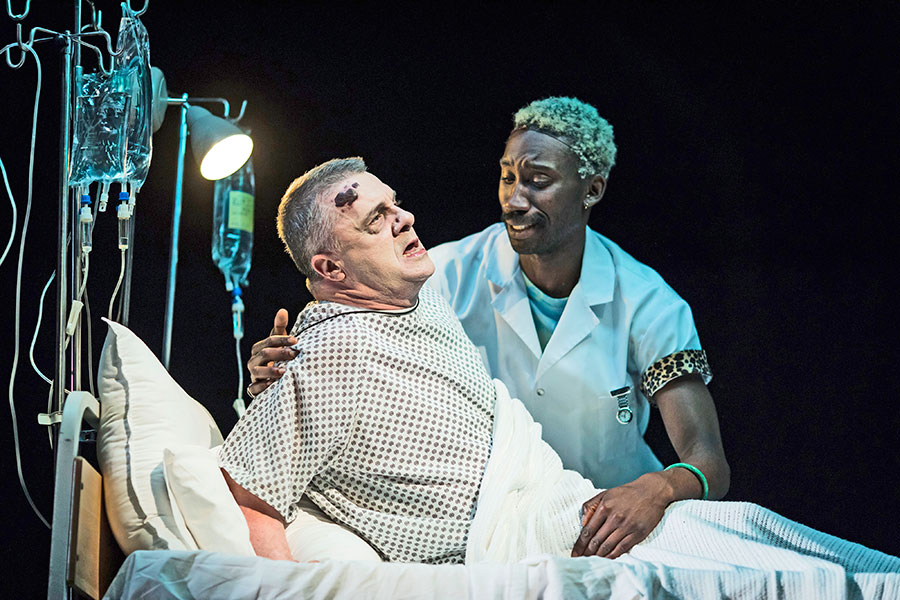Theatergoers who can’t travel to London for the National Theatre’s 25th-anniversary revival of Tony Kushner’s award-winning drama “Angels in America” are in luck: The Bryn Mawr Film Institute, 824 W. Lancaster Ave., will screen broadcasts of the two-part play recorded live on successive weekends.
“Part One: Millennium Approaches” will be shown Aug. 5-6. And on Aug. 12-13, audiences can see “Part Two: Perestroika.” Tickets for each show are $20.
“Angels in America” is noteworthy for being one of the first serious dramas to address the AIDS crisis. It is set in the mid-1980s, when a diagnosis of HIV meant certain death. It’s an ambitious, sprawling play that mixes reality and fantasy, fictional characters and historical figures. Poignant scenes between struggling couples alternate with philosophical discourses and flights of fancy.
Two couples are central to the play. First, there is Louis, a bookish man working as a word processor, and his lover, Prior, who is diagnosed with AIDS. Their relationship runs parallel to that of Joe, a closeted Mormon lawyer, and his long-suffering wife, Harper.
Other significant parts include Belize, a former drag queen now working as a nurse; Roy Cohn, the infamous New York power broker; and the Angel.
When “Angels in America” was first staged, it offered a stark contrast to shows like “Cats,” which dominated Broadway during the 1980s. The play examined AIDS, death, love, politics and our obligations to one another. It also required serious sitzfleisch — both halves of the play last roughly four hours.
Both audiences and critics recognized that they were witnessing something special. “Millennium Approaches” won the Pulitzer Prize for Drama, and both parts were awarded a Tony for Best Play.
The current revival celebrates the 25th anniversary of the National Theatre’s 1992 production of “Millennium Approaches.” That show’s success paved the way for the play’s 1993 opening in New York.
Principal cast members include Andrew Garfield of “Spider-Man” fame as Prior and James McArdle from “Star Wars: The Force Awakens” as Louis.
The juiciest role undoubtedly belongs to Nathan Lane, who portrays Roy Cohn. Kushner based the character on an actual person. Cohn first garnered notoriety for his role in the Army-McCarthy hearings. In the play, he’s a self-loathing Jew and closeted gay man who’s ruthless in his pursuit of power.
In an interview with National Theatre, Lane said Cohn is “someone who did a lot of horrible things, and he was a hypocrite and a bully and a liar and a cheat. But quite brilliant.”
At first glance, the character is an odd fit for the comedian. Cohn’s vitriol and spluttering rage were a natural fit for actors Ron Leibman and Al Pacino, who played the part earlier. Still, Lane was drawn to the role. “It’s one of those incredible parts,” he said. “I just felt I had to be a part of it.”
An example of Cohn’s demeanor occurs early on, during an argument with his doctor, Henry. When Henry tells Cohn that he has AIDS, the lawyer explodes.
“Roy Cohn is not a homosexual,” Cohn says. “Roy Cohn is a heterosexual man, Henry, who fucks around with guys.”
“AIDS,” he continues, “is what homosexuals have. I have liver cancer.”
Cohn is clearly a despicable character, but he’s not the only one in “Angels in America” whose words and behavior hurt others terribly. Precisely when Prior needs Louis the most, Louis abandons him. Similarly, Joe’s duplicity about his marriage and his true sexuality pushes his wife to the brink of insanity.
Such flawed, contradictory characters present a significant challenge: Do we sympathize with them or revile them? Their shortcomings will also prod audiences to wonder how we would act in similar circumstances.
Much has changed since “Angels in America” was originally staged. Drug cocktails developed by the mid-1990s transformed HIV from a death sentence into a manageable chronic condition.
So why, other than the anniversary, revive “Angels in America” now? Interestingly, Roy Cohn may provide an answer: In real life, he was Donald Trump’s lawyer and mentor.
Kushner’s play unfolds against the backdrop of the Reagan administration, which was largely indifferent to the AIDS crisis. Today, a new administration, headed by a man with direct ties to Cohn and backed by a loose coalition of evangelical Christians, free-market zealots and right-wing Republicans, is placing vulnerable people in a precarious position. The rights and well-being of immigrants, the infirm, women and transgender individuals as well as gay men and lesbian women are being threatened.
How will we, as Americans, handle the current crisis? As Belize tells Louis, “Justice is simple. Democracy is simple. Those things are unambivalent. But love is very hard. And it goes bad for you if you violate the hard law of love.”
What we must now avoid, once again, is violating love’s law.
For more information, visit www.BrynMawrFilm.org.

